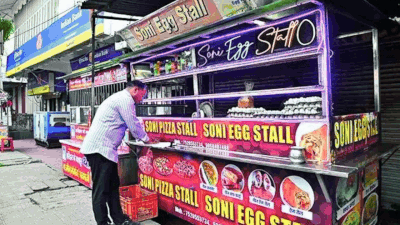MEERUT/MUZAFFARNAGAR/AGRA: There was trepidation along long stretches of the kanwar yatra route, which snakes through swathes of UP en route to Haridwar in Uttarakhand, following UP govt’s order requiring all shops and eateries to display names of owners and employees.
On a bustling Muzaffarnagar road, Kashif Confectionery has put up a poster stating the owner’s name: Furkan.He greeted customers with a smile but said, “We never consider whether a shopkeeper is Hindu or Muslim when we celebrate Ramzan and Eid. Why are we being asked to disclose our identity now? Many customers may just turn away upon seeing my shop’s name.”
Must not drag biz into communal politics: UP trader
A TOI team that on Friday fanned out across three districts with major kanwariya traffic – Muzaffarnagar, Meerut, Agra – found that at almost every place where Muslim traders have put up stalls, are running eateries or selling yatra-related goods, there was gloom and despair. Many have already started losing jobs and packing bags to move elsewhere.
As per some estimates, around 4 crore people undertake the yatra, with about 2.5 crore passing through UP.
Rizwan Chaudhary said he woke up to a call recently from Kairana police station that instructed him to shut down his Tiranga Dhaba until the yatra, which begins on Monday. “That’s almost a month,” he said. “I am staring at a big loss. I only serve pure vegetarian food. I don’t even use onions and garlic. Why do I have to do this? I was ready to put my name on the board outside my establishment.” His dhaba is on Shamli-Panipat Road in Kairana, one of the busiest yatra routes.
An administrative order issued last week in Muzaffarnagar mandated that all establishments selling food display the names of their owners and employees. Though the directive sparked a political storm, it was swiftly extended to Shamli and Saharanpur districts by IG (Saharanpur range) Ajay Sahani. On Friday, UP govt further expanded the order, imposing it across the entire kanwar route, affecting several districts.
Kapil Dev Agarwal, Muzaffarnagar city’s BJP MLA and a state cabinet minister, the man who had recently said Muslims should not name their shops after Hindu deities, told TOI: “There is nothing wrong with this order. Some establishments use Hindu names while their owners are Muslim. We have no objection to that. The problem arises when they sell non-vegetarian dishes.”
Muslim community members said the move can be seen as a step to marginalise a section by choking their means of earning. “It will have economic ramifications,” they said.
Mohammad Irshad, owner of Bijnor’s Shri Khatu Shyam Tourist Dhaba, said, “The irony is that the order will hurt both communities. My establishment is on a road frequented by kanwariyas. We serve pure vegetarian food, and my employees are Hindus. If customers see my name, footfall will decrease, & we will suffer losses regardless of our faith. Business must not be dragged into communal politics.”
The immediate economic fallout of the order is already visible. Shafaqat Ali, 48, was sent on “forced leave”. He is one of four workers at Sakshi Tourist Dhaba on Delhi-Dehradun highway in Khatauli police station area. “Our employer asked us to go on leave until the yatra ends on Aug 6,” Ali said. His employer, Lokesh Bharti, said, “A week ago, police asked us to write down names of the owner and employees at the dhaba. They said I could not keep them at my dhaba if their names are not displayed. I decided they must stay away for now.”
Dr Dinesh Kumar, professor of Economics at Chaudhary Charan Singh University, Meerut, said, “Besides political repercussions, economic impact must be considered while making such decisions. Economy is intertwined with the social fabric in smaller towns, and balance is crucial. If that fabric is ripped to shreds, everyone suffers, regardless of faith or caste. No festival can be seen in isolation as various communities contribute.”
Muslim businessmen also talked about the possibility of physical harm. Mohd Imran, a fruit seller from Meerut, said, “Once my name is written on my cart, who will guarantee my safety? Anyone can misbehave with me or rob me. And what happens if a riot breaks out? I will be a sitting duck.”
